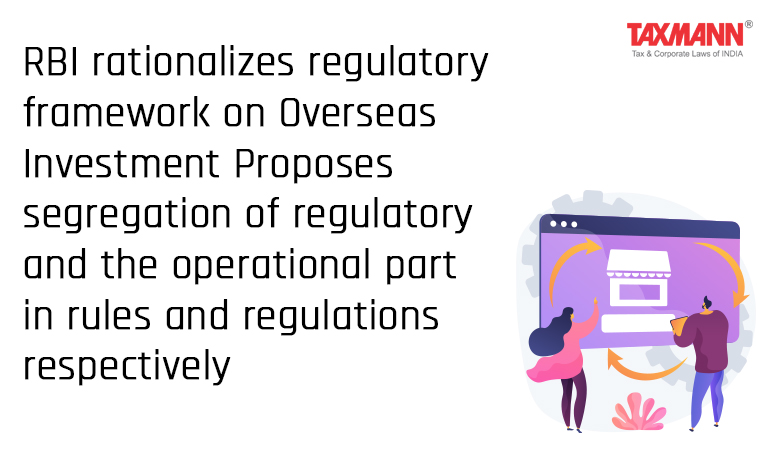RBI rationalizes regulatory framework on Overseas Investment; Proposes segregation of regulatory and the operational part in rules and regulations respectively
- Blog|News|FEMA & Banking|
- 2 Min Read
- By Taxmann
- |
- Last Updated on 25 August, 2021

[2021] 129 taxmann.com 232 (Article)
Investments by Indian entities outside India is a very common phenomenon and several companies have a presence outside India by virtue of forming a Joint Venture (‘JV’) and Wholly Owned Subsidiaries (‘WOS’)
With the enforcement of amendment proposed in Finance Act, 2015 in October, 20191 powers vested with Central Government (CG) and Reserve Bank of India (RBI) with respect to permissible Capital Account Transaction were revisited. Power to frame rules relating to Non-Debt instruments (‘NDI’) was vested with CG and to frame regulations relating to debt instruments were vested with RBI. The scope of NDI inter alia covers all investment in equity instruments in incorporated entities: public, private, listed and unlisted; acquisition, sale, or dealing directly in immovable property.
RBI intends to combine erstwhile FEMA (Transfer or Issue of Foreign Security) Regulations, 20042 (‘erstwhile ODI regulations’) and FEMA (Acquisition and Transfer of immovable property outside India) Regulations, 20153 into FEMA (Non-debt Instruments – Overseas Investment) Rules, 20214 (‘NDI Rules’) and FEMA (Overseas Investment) Regulations, 20215 (‘OI Regulations’) and has rolled out the draft regulations for public comments to be sent by August 23, 20216.
NDI Rules v/s OI Regulations
NDI Rules will provide the regulatory framework for making overseas investments covering the permissions, conditions for making overseas investment, restrictions from making Overseas Direct Investment (‘ODI’), pricing guidelines, transfer, liquidation, and restructuring of ODI. While the NDI Rules will be framed by CG, however, the same will be administered by the RBI.
OI Regulations, on the other hand, will provide only the operational part covering conditions for undertaking Financial Commitment (‘FC’), other than investment in equity capital, consideration in case of acquisition or transfer of equity capital of a Foreign Entity (‘FE’), mode of payment, obligations of Persons Resident in India (‘PRII’), reporting requirements, a consequence of delay in reporting and restrictions on further FC/transfer.
Click Here to Read the Full Article
Disclaimer: The content/information published on the website is only for general information of the user and shall not be construed as legal advice. While the Taxmann has exercised reasonable efforts to ensure the veracity of information/content published, Taxmann shall be under no liability in any manner whatsoever for incorrect information, if any.

Taxmann Publications has a dedicated in-house Research & Editorial Team. This team consists of a team of Chartered Accountants, Company Secretaries, and Lawyers. This team works under the guidance and supervision of editor-in-chief Mr Rakesh Bhargava.
The Research and Editorial Team is responsible for developing reliable and accurate content for the readers. The team follows the six-sigma approach to achieve the benchmark of zero error in its publications and research platforms. The team ensures that the following publication guidelines are thoroughly followed while developing the content:
- The statutory material is obtained only from the authorized and reliable sources
- All the latest developments in the judicial and legislative fields are covered
- Prepare the analytical write-ups on current, controversial, and important issues to help the readers to understand the concept and its implications
- Every content published by Taxmann is complete, accurate and lucid
- All evidence-based statements are supported with proper reference to Section, Circular No., Notification No. or citations
- The golden rules of grammar, style and consistency are thoroughly followed
- Font and size that’s easy to read and remain consistent across all imprint and digital publications are applied



 CA | CS | CMA
CA | CS | CMA
